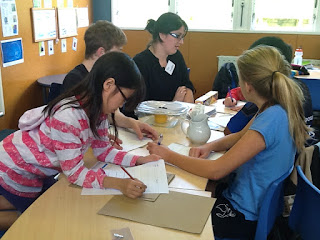The closure was really fun (in a sadistic kind of way initially). We received a letter from the NZFD [the client] thanking us for all our hard work but that we didn't get the job. The kids were dumbstruck
'How could we not get the job'
'This isn't like the movies' etc.
Then I emailed them from Wirimu and said that he had overheard some people talking as he was clearing his office. They said that the company that are financially supporting the project may not want to have such a close affiliation with a company that is so passionate about the environment.
I think 1 kid said 'well we shouldn't worry about the environment then.' He was shut down straight away with comments about us not changing our beliefs for the sake of a job.
What a brave move - and one I would possibly have been worried about taking myself... All that work, for 'nothing'? But Andy knows the children and knew that this outcome would challenge them to think about professional bottom lines. And what a valuable lesson they learned about standing by ones principles... this is a lesson for life AND for business....
Andy's email goes on to describe the conversation children had about what to do. Initial thoughts were to take action - either personal (one suggested violence) or legal. What did eventuate was some passionate written work.
You should see some of the writing - talk about powerful. You won't believe some of it is from 10 year old children... There's also some that argue for the testing of animals in a safe and humane way for the good of the human race... [There are some] really powerful and logical arguments.
Here is a short extract from one girl's writing arguing against animal testing.
"Due to the natural process of evolution, we humans have evolved into highly intelligent major species, but at the same time, barbarian savages, sacrificing the lives of the innocent, minor and not as highly intelligent species for our successful medicinal products. Plain unfair."
While it is too much to claim that the mantle taught the children to write this way - it would seem that the experience took children to a place where they felt passionately enough to write their best.
It would have been interesting if the writing had been framed firmly within the mantle and written from an adult perspective, as members of the company... as it was, I think the children wrote as children - but with the passion of the experience behind them.
Andy goes on to describe how he carried out the closure of the mantle, and the interesting reflective conversations with the children.
We closed this up a few weeks ago now by doing the book thing. [Children were invited to imagine a large book in their hands - as if they were holding the journal of their six week journey through the mantle]. They all looked at the size of their books, the best pictures, the hardest narratives they had to play out, the highs and the lows before putting it on the shelf.
Interestingly when we talked about the Mantle and what lessons we would take into our class life and what we would not, the girls were the ones who said that it was too talkie. Some agreed while others said that we had to talk the problems out so it was necessary. It was a lot of the boys who chimed in with what we could take from the Mantle in to our everyday schooling life.
"I liked getting talked to and talking like an adult"
"I liked actually working together to bring the presentation to life'
"I liked being someone else but not at the same time"
And so another mantle adventure comes to an end. I extend huge thanks to Andy and the children at HNS. Also to the Principal, Deputy Principal and Board for entrusting us with the class. To Claire for coming along for the ride. And to the student teachers for being true colleagues. I have so enjoyed working with these reliable, reflective and fun fellow travelers on this journey.
















